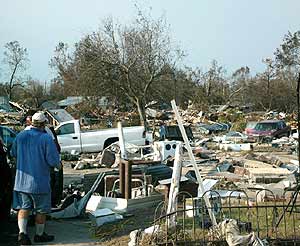Tsunami nations lend disaster advice to U.S.
By Ed Cropley, Reuters, Sept 5, 2005
BANGKOK, Thailand -- Police in the United States must not rush to identify the bodies of Hurricane Katrina victims too quickly or they will run the risk of countless mistakes, the head of Thailand's tsunami identification operations said on Monday.
 "They need to examine the bodies slowly and put all the data into a computer," said Nopadol Somboonsub, a police general in charge of the Thailand Tsunami Victims Identification Centre on the southern resort island of Phuket.
"They need to examine the bodies slowly and put all the data into a computer," said Nopadol Somboonsub, a police general in charge of the Thailand Tsunami Victims Identification Centre on the southern resort island of Phuket.
"It's very important to get it right. You cannot assume that this or that body is the right body simply because a relative identified it," he said, adding that identity theft and life insurance fraud were realities in the wake of massive disasters.
As the head of the largest forensics operation in history, trying to put names to the 5,395 bodies of at least 25 nationalities left in Thailand by the Indian Ocean disaster, Nopadol does not speak without authority.
Nor is he alone in Asia in seeing the TV images of bloated corpses in New Orleans and death tolls estimated in the thousands and thinking how the experiences of the region after the Dec. 26 tsunami might help the United States after Katrina.
In India, where officials say the grassroots are the key to successful relief operations, some felt the United States -- the world's most powerful nation -- might have slipped up by thinking itself a match for anything Mother Nature could muster.
"In a disaster, the biggest fallibility can be to think you are experts. Disasters have a way of humbling even the mightiest," said one senior Indian official at the heart of New Delhi's tsunami response.
"In India, for all its vastness, we have a very easily operable contingency plan for disasters at the grassroots level. It is not a highly complicated national response system," said the official, who asked not to be identified.
"A person at the grassroots level knows that sandbags have to be organised, identifies likely places of breaches, plans clearing debris and setting up relief camps and cooking centres," he said.
"From what I have read about Katrina, it doesn't seem to have happened this way there. They seemed to have focused on Florida and got caught unawares in New Orleans," he said.
"STAY FOCUSED"
Budi Atmadi, head of relief operations in the Indonesian province of Aceh, which bore the brunt of the killer tsunami waves, said rescue workers must not let criticism from victims, politicians or the media deflect them from their jobs.
"The early days after the disaster are always panic situations," said Atmadi, the deputy secretary of Bakornas BPB, Indonesia's equivalent of the U.S. Federal Emergency Management Agency (FEMA).
"In that period, the blame game is rampant because one person will always say the relief has been slow while another says there are so many limitations," said Atmadi. "The blame game will always be there so your ears need to be thick.
"The important thing is to stay committed and put humanitarian concerns at the top."
In a sign of solidarity with the United States, which sent a massive military relief effort after the tsunami, Indonesia's chief welfare minister Alwi Shihab plans to fly to New Orleans with 5,000 blankets and 30 medical officials.
Disaster workers in Sri Lanka, where the tsunami killed 40,000 people and left another million homeless, said it was vital that anybody who can help does so -- an ingredient they saw as vital to ensuring the death toll did not rise higher.
Buddhist temples, churches and schools became makeshift shelters in the days following the disaster, ordinary Sri Lankans fanned out to help and companies managed relief camps.
"People collected foodstuffs, clothing and everything was rushed down to those areas to be delivered to the people. I think that really was the success story here," said Rohini Nanayakkara, deputy head of TAFREN, the country's tsunami reconstruction body.
"The people in those areas themselves, they helped in the relief operation. The fishermen themselves, they got together and rescued the bodies, took them to hospitals," she said. "The private sector got involved in a big way." (Additional reporting by Simon Gardner in COLOMBO, Achmad Sukarsono in JAKARTA and Y.P. Rajesh in NEW DELHI)

 "They need to examine the bodies slowly and put all the data into a computer," said Nopadol Somboonsub, a police general in charge of the Thailand Tsunami Victims Identification Centre on the southern resort island of Phuket.
"They need to examine the bodies slowly and put all the data into a computer," said Nopadol Somboonsub, a police general in charge of the Thailand Tsunami Victims Identification Centre on the southern resort island of Phuket.